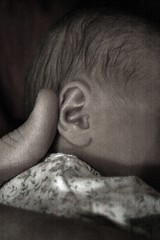grainy perception
I have a friend whom, after a couple decades of reading lips, received a cochlear implant, and had quite a bit of hearing restored. When I spoke with her soon after, she expressed that she didn’t like to use her implant, because she couldn’t sort out what she was hearing. If someone spoke to her, she couldn’t differentiate between the sound of his or her voice, and any other noise in the room. The clicking of the computer keys drove her batty.
When a baby’s ears begin to work in utero, no doubt that little brain begins to sort out sounds because sometimes it seems that a parent’s voice is soothing to a newborn. I tend to believe that it is recognized and filed as comforting. But the baby continues to learn to sort sounds and their sources after she is born and after she has learned to sort visual stimuli.
Some people who have had sight restored reported seeing moving patches of color, but had no mental category in which to perceive what those patches might be. A blind man Jesus healed expressed that he saw “men like trees walking.” Who knows what his mental perception of humans was before he had ever seen. It is also said that though unsighted people negotiate furniture well, and obviously understand, depth as once they’ve walked around an object, they know that it is now behind them, some newly sighted folks lose this perception once they gain sight. Once the brain is able to see an obstacle, the perception of depth and environment changes so that some have stepped backward into things that they just walked past. Seeing it move from in front of them to beside them, did not register that it was now behind them. Space had always been a tactile perception.
So it would seem that a baby has some differentiation for sounds before he is born, but further categorizes their sources even after she is born and achieves the ability to process visual stimuli. The interesting thing about this, is that a baby has no choice but to consider (even if subconsciously at first) everything that comes across the cerebral cortex and over a long life of learning, to attempt to categorize, combine, simplify, and make since of all the various bits of information that are being received.
In the early years, there aren’t a lot of categories, maybe yeses and nos make up the majority of concepts. Connections and perceptions are grainy and lo-res. As she grows, the perceptions gain clarity and resolution and the foundation is laid for deeper understanding. Society though, perhaps unwittingly, places a graduation day on forming of categories, and humans begin to check out when offered ideas that challenge the premature closing of the door to concepts.
So why ramble on about all of this? I believe that there are those among us who never stop sorting out stimuli and creating new categories for processing it and understanding it. As we go through life, not only does new information often require new categories, but sometimes the new categories demand that we go back and re-file previous information that we now know has been filed wrongly (or, God forbid, actually delete information that has been shown to be unreliable.)
There are also those among us (perhaps a great deal more in the majority) who stopped creating categories long ago. For these people, every new experience, every new bit of information has to be filed in a previously created folder. Perhaps often, new things are filed in folders into which they don’t quite fit. At least as often, when there is not a handy category under which to file the experience or information, it is promptly rejected. An experience may be as real as the taste of chocolate, the information as obvious as the nose on your face, but it will be denied if it doesn’t have a pre-existent folder into which to file it.
I’ve often attempted to explain my odd filing system to my more modern friends by means of epistemology. I can explain that my elementary school understanding of the world was formed based on Einstein’s ideas, some of which hadn’t even been named yet (the term, “black hole” was not coined until I was in Kindergarten.) With this grid, or filter through which to observe and learn and believe as I grew up, my modes of understanding were created quite differently than were my parents’ and grandparents’ – even when we arrived at the same beliefs and conclusions. In fact, new scientific discoveries – or rather, the increased public knowledge of these discoveries – have demolished religious beliefs of a great many people who had long since closed their folders and locked in the criteria by which they would believe.
It is ever so difficult to communicate with someone who does not have a folder for the information or concepts you are trying to make them understand. In my experience, it is even more difficult when they insist that they do, and continually place your concepts in their own wrong folder.
The hardest people to make understand you are those who think they already understand. These are even more difficult than those who don’t want to understand. In these cases, they reject not only your info and your concepts, but often they write you off as well. If they’re kind, they’ll pat you on the head and pray that you “get with the program.”
I sometimes wonder if anyone understands anyone anymore. I do believe that outside of small groups of friends, conversation and dialogue are only euphemistic terms. I wonder if we’ve created a system in which we take turns talking within the hearing of others, but it needn’t matter what we say, because we use only a prescribed jargon set, and references to concepts that none of us could really explain if we were actually to begin a dialogue about them.


<< Home